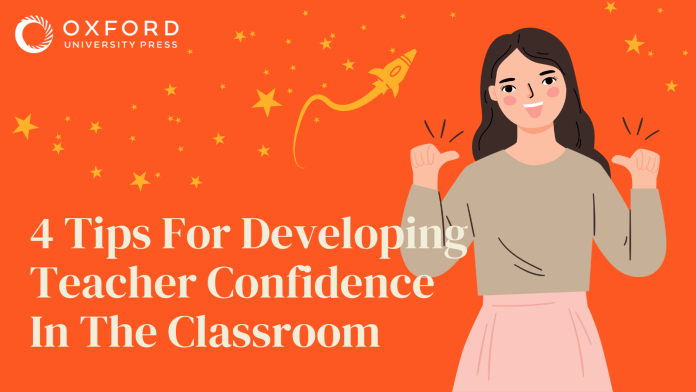Most teachers have been there. One student disagrees with your answer and next, other learners start to disagree, ‘that’s not what you told us last week, teacher….’ Suddenly you are no longer sure if what you told them is actually correct. Even though moments of self-doubt can be healthy to keep teachers on their toes, moments like this can also make teachers feel less positive about their teaching abilities and affect teacher confidence.
What is teacher confidence?
Self-efficacy or self-confidence refers to what we think we can do. Teacher confidence, which often increases over time, relates to the belief in one’s teaching skills and one’s confidence in teaching abilities. Even for experienced teachers, teacher confidence can vary because it is highly context-dependent.
How confident a teacher feels about their abilities depends on various aspects, such as subject knowledge, pedagogical knowledge, knowledge of the learners involved, knowledge of how to manage them and the learning process as well as practical teaching skills. As a result, teacher confidence can vary from situation to situation and task to task.
The importance of teacher confidence
Research has shown that teachers’ beliefs about their own teaching abilities affect how they approach and teach their students. Feeling confident in the classroom not only contributes to greater job satisfaction (Toropova et al. 2020) but also enables teachers to act more confidently: they are more willing to try out new ideas and approaches and are better able to manage emerging challenges. They also tend to be better at engaging students and seem to have a positive impact on achievement and social-emotional growth (NIOE, 2016). So, how can we become more confident in the classroom?
Tips on how to develop teacher confidence
Great teachers are not born, they develop over time (Wiens & Ruday, 2014). Teacher confidence improves through building ability and growing competence, which comes with practice and experience in teaching. Below are some ideas that can help any teacher to further grow their confidence in the classroom.
1. Plan & prepare
Having a clear idea of what you want learners to learn and how you want them to get there, the activities and procedures, will give you confidence.
- Plan how to set up the tasks, prepare your instructions and check the answer key (because, you know …).
- Use a lesson framework which includes set routines, such as think-pair-share or peer-checking after receptive tasks. These routines will allow some mental space needed to respond to emerging needs.
- Consider what could go differently than planned, related to the language you are teaching, the tasks, equipment and students’ challenges. Next, think of possible solutions so you can respond more confidently.
2. Create connections
Knowing your learners and having positive relationships can help you feel more relaxed in your teaching context.
- Purposefully plan, particularly when starting with a new group, to find out about your learners (interests, background, etc.) and allow them to get to know you.
- Personalise speaking and writing topics from the coursebook and show a genuine interest in learners’ responses and their experiences. Avoid responding only to their language use!
- Knowing your learners and their areas of strength and lesser strengths means you will have a deeper understanding of their needs and will feel more confident to respond.
3. Buddy up
Confidence comes not only from teaching but also from learning from teaching. Doing this together with a more experienced teacher can boost confidence building.
- Observing more experienced teachers can show new, or more effective ways of doing things, or confirm that you are doing the right thing already.
- Ask an experienced colleague to observe you and provide some feedback on your chosen areas of strength. Praise and positive feedback from others build confidence.
- Create a community of practice or personal learning network. Ask expert teachers for their take on challenges you feel you want to manage more confidently, e.g. managing disruptive learners.
4. Be kind to yourself
All teachers, even the best, can still improve because everyone can always be better. So don’t feel the need to be perfect!
- Acting as if …. Mental confidence is a good starting point. Thoughts are powerful. Use positive affirmations e.g. I’m a capable teacher, I’m becoming a better teacher every day to boost confidence.
- Accept we all are a work in progress! If things don’t go to plan, have a growth mindset – see it as feedback for the next step in your teaching journey, rather than failure.
- Trust that you have what it takes! Focus on your areas of strength and reflect on what makes these areas strong. Is there anything you can transfer to areas you want to strengthen?
Remember, teachers are learners too. Developing teacher confidence takes time but you don’t need to be perfect to be a confident teacher.
Do let us know what ways you build your confidence!
Anna Hasper is an experienced teacher development specialist based in Dubai. She has written teacher development courses for Language Fuel, NILE, The British Council, IDP IELTS and various Cambridge Educational Reform projects. She frequently presents at international conferences and is a regular writer for Modern English Teacher. Her special research interests are educational psychology, teacher development and enhancing effective learning.



ACADEMIC and Education sector is a part of service sector of the Economy. It has to endorse itself with the skill set and talent pool. Human skills and inter personal skills are subtle skills to a healthy mental health. These skills stand for their virtue as and far by so called ENTRANCES TEST. ??
Good and helpful tips.
Really helpful
Thank you very much for the tips.